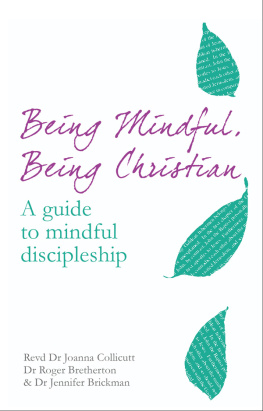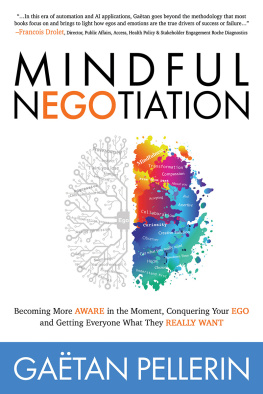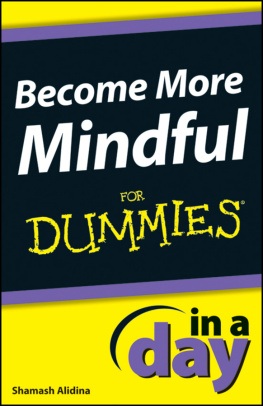Henningsen - Mindful Programming
Here you can read online Henningsen - Mindful Programming full text of the book (entire story) in english for free. Download pdf and epub, get meaning, cover and reviews about this ebook. year: 2021, genre: Religion. Description of the work, (preface) as well as reviews are available. Best literature library LitArk.com created for fans of good reading and offers a wide selection of genres:
Romance novel
Science fiction
Adventure
Detective
Science
History
Home and family
Prose
Art
Politics
Computer
Non-fiction
Religion
Business
Children
Humor
Choose a favorite category and find really read worthwhile books. Enjoy immersion in the world of imagination, feel the emotions of the characters or learn something new for yourself, make an fascinating discovery.

- Book:Mindful Programming
- Author:
- Genre:
- Year:2021
- Rating:4 / 5
- Favourites:Add to favourites
- Your mark:
- 80
- 1
- 2
- 3
- 4
- 5
Mindful Programming: summary, description and annotation
We offer to read an annotation, description, summary or preface (depends on what the author of the book "Mindful Programming" wrote himself). If you haven't found the necessary information about the book — write in the comments, we will try to find it.
Mindful Programming — read online for free the complete book (whole text) full work
Below is the text of the book, divided by pages. System saving the place of the last page read, allows you to conveniently read the book "Mindful Programming" online for free, without having to search again every time where you left off. Put a bookmark, and you can go to the page where you finished reading at any time.
Font size:
Interval:
Bookmark:
Mindful Programming
Contents
On one side of this clash we have People of the Book. These are the good people who make newspapers, magazines, the doctrines of law, the offices of regulation and the rules of finance. They live by the book, by the authority derived from authors, and are centered at the power points of New York City and Washington. The foundation of this culture is ultimately housed in texts. They are all on the same page, so to speak.
On the other side (and on an axis that runs through Hollywood and Redmond, Wash.) we have the People of the Screen... screen culture is a world of constant flux, of endless sound bites, quick cuts and half-baked ideas. It is a flow of gossip tidbits, news headlines and floating first impressions. Notions don't stand alone but are massively interlinked to everything else; truth is not delivered by authors and authorities but is assembled by the audience.
~Kevin Kelly, "Will We Still Turn Pages"
This book is a failed attempt at a blog post. It began with a simple enough idea throughout history, developing and open-ended professions have served as metaphors for inner development. I set out to explore whether programming could be a modern example of this tradition. As I wrote, I found the subject refused to be boiled down the way most can. Pop culture, the role of algorithms in our society, the way we think about our own minds and more all touched this central question, and exploring the connections brought in yet more unexpected fields. This books structure reflects its and one more thing origins. I hope the value of the ideas to follow are not hampered by the stylistic choices I have made in presenting them. Nonetheless, I would like to offer some apology for them.
This book has been written in a time when reading is more common than ever before, but finding time to read is increasingly difficult. I have therefore arranged the text into a larger number of shorter chapters my goal was to make each of these able to stand on its own, while still forming a pleasing mosaic when viewed as a whole.
Like its author, this book is a product of its time. It was written in an era when most writing was already online, and citations could be elegantly placed within the text itself. Though I prefer to read in this style, some ideas are too complex to be put forth in a blog post. Aesthetic considerations, difficulty of citing online sources, the ease of digging deeper given relevant keywords, and an ongoing replicability crisis in relevant areas of research have all contributed to my decision against employing footnotes or otherwise breaking the flow of the writing. If a reference sparks curiosity in the reader, I trust it will be easy enough to find current information on the subject. If it does not spark curiosity, I prefer it wastes as little time as possible.
That said, this book did not spring fully formed from my mind I had myriad sources of inspiration to whom I am very grateful. Rather than making reference to them at the end of the text, I have opted to put their words front and center, to introduce this books many short chapters. The words and ideas are largely theirs my own contribution has been mostly confined to their synthesis.
Yes, these primitives in the twentieth century did fiddle around with these gadgets called computers. But really what they were doing is starting to learn how to formalize intuitions about process.
~ Hal Abelson and Gerald Jay Sussman, Structure and Interpretation of Computer Programs, 1986
It is fair to say this book would not exist if I had not encountered the course quoted above. I was far from the only one to draw inspiration from it despite its being as old as I am in a rapidly changing field, many people still find it a valuable and inspiring resource. Those unfamiliar with it might wonder why.
A clue might be found in this quote from the course:
Geometry is another subject with a terrible name. The name comes from Gaia, meaning the Earth, and Metry, meaning to measure. Geometry originally meant measuring the earth, or surveying. And the reason for that is that thousands of years ago, the Egyptian priesthood developed the rudiments of geometry to figure out how to restore the boundaries of fields. To them, geometry really was the use of surveying instruments. Now the reason that we think computer science is about computers is pretty much the same reason its very easy to confuse the essence of what youre doing with the tools that you use.
This kind of language, and the wizard in the videos thumbnail who could have stepped straight from the pages of the Advanced Dungeons & Dragons Players Handbook , evoke a sense of awe and wonder that might feel out of place in what can be a frustrating calling. That sense of awe, I believe, is the reason people return to this venerable course even today. A minority of todays programmers use Lisp, but the value of the course is not primarily to make the student fluent in Lisp. It is primarily to inspire.
Programming is a new art. It is not a science, though it is used in and makes use of science. Like geometry when that got its name, programming is a new field whose implications are not fully known. We intuit that formalizing processes will change the world, and because of that we are fascinated by the discipline. But these are still early days we havent integrated programming into our society, though we are trying, and we have not settled on any universal best practices. Programming is the new literacy goes the refrain, but illiteracy is still the norm.
We can make an analogy to alchemy here. Before chemistry was formalized, there was alchemy the central tenets of the field were so vaguely understood that it could not be studied scientifically. There werent enough axiomatic truths to base a science on, so it was a realm of artisans. Some were clearly better at it than others, but none were so skilled that they could just explain it to novices in simple language. When they taught the art, they mostly gave their students a problem and asked them to come back with a solution. This might sound familiar to anyone whos had to train new programmers.
Alchemy was a real discipline that yielded real results, but what separates it from chemistry is that these results couldnt be reliably reproduced or understood. Today, we think of alchemists as madmen or charlatans, convincing wealthy patrons they were about to turn lead into gold. But this is not accurate. Trying to make the philosophers stone was not what most alchemists did all day, there were many more attainable projects they tackled which often did yield impressive results theres a reason the British still call their pharmacists chemists. But more importantly, the alchemists stressed the primal importance of inner work the idea that what the alchemists did in the laboratory was an analogy for internal changes, changes that were more important than the external manifestations of their skill. The refinement of a substance was a metaphor for the refinement of the person, and the most skilled alchemist by definition had the best character.
Chemistry was not the first art to make this analogy. Geometry, via architecture, produced artisans with a similar attitude of perfecting the inner self as both prerequisite and goal with regards to being excellent in their work. The order of Freemasons continues this tradition into the present day. The way of the Samurai took a similar approach to martial skills. Many disciplines through history have treated self-improvement as the reward for successful work, and there are likely to be more. When a truly open-ended field of study comes along, its practitioners are by necessity groping in the dark. There are no objective standards for who is doing it correctly until some basic axioms are settled. How well the practitioner deals with the vicissitudes of life is a better indicator than most of how well they are advancing the art.
Font size:
Interval:
Bookmark:
Similar books «Mindful Programming»
Look at similar books to Mindful Programming. We have selected literature similar in name and meaning in the hope of providing readers with more options to find new, interesting, not yet read works.
Discussion, reviews of the book Mindful Programming and just readers' own opinions. Leave your comments, write what you think about the work, its meaning or the main characters. Specify what exactly you liked and what you didn't like, and why you think so.











